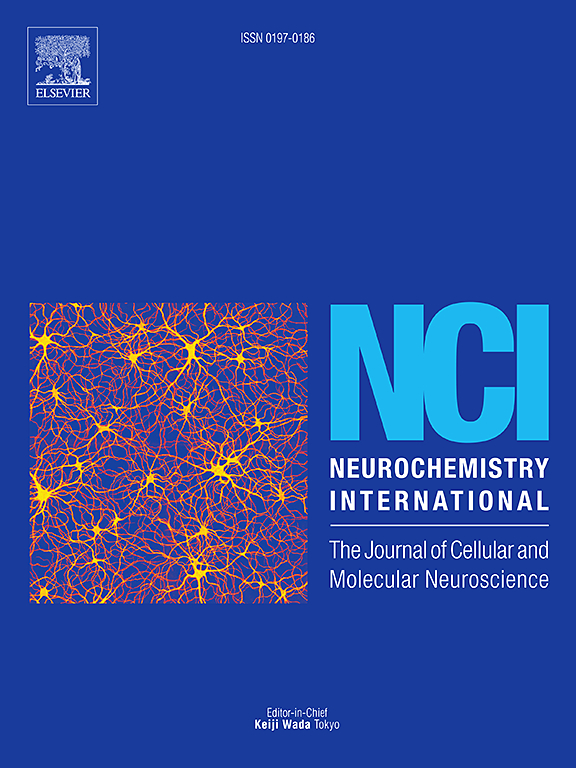LASP1 in the nucleus accumbens modulates methamphetamine-induced conditioned place preference in mice
IF 4.4
3区 医学
Q2 BIOCHEMISTRY & MOLECULAR BIOLOGY
引用次数: 0
Abstract
Methamphetamine (METH) is a highly addictive and widely abused drug that causes complex adaptive changes in the brain's reward system, such as the nucleus accumbens (NAc). LASP1 (LIM and SH 3 domain protein 1) as an actin-binding protein, regulates synaptic plasticity. However, the role and mechanism by which NAc LASP1 contributes to METH addiction remains unclear. In this study, adult male C57BL/6J mice underwent repeated METH exposure or METH-induced conditioned place preference (CPP). Western blotting and immunohistochemistry were used to determine LASP1 expression in the NAc. Furthermore, LASP1 knockdown or overexpression using adeno-associated virus (AAV) administration via stereotactic injection into the NAc was used to observe the corresponding effects on CPP. We found that repeated METH exposure and METH-induced CPP upregulated LASP1 expression in the NAc. LASP1 silencing in the NAc reversed METH-induced CPP and reduced PSD95, NR2A, and NR2B expression, whereas LASP1 overexpression in the NAc enhanced CPP acquisition, accompanied by increased PSD95, NR2A, and NR2B expression. Our findings demonstrate an important role of NAc LASP1 in modulating METH induced drug-seeking behavior and the underlying mechanism may be related to regulate the expression of synapse-associated proteins in the NAc. These results reveal a novel molecular regulator of the actions of METH on the NAc and provide a new strategy for treating METH addiction.
小鼠伏隔核中的 LASP1 可调节甲基苯丙胺诱导的条件性位置偏好。
甲基苯丙胺(METH)是一种极易上瘾且被广泛滥用的药物,它会导致大脑奖赏系统(如纳氏核)发生复杂的适应性变化。LASP1(LIM 和 SH 3 结构域蛋白 1)是一种肌动蛋白结合蛋白,可调节突触的可塑性。然而,NAc LASP1在METH成瘾中的作用和机制仍不清楚。在这项研究中,成年雄性 C57BL/6J 小鼠接受了反复的 METH 暴露或 METH 诱导的条件性位置偏好(CPP)。研究采用了 Western 印迹和免疫组织化学方法来确定 LASP1 在 NAc 中的表达。此外,我们还使用腺相关病毒(AAV)通过立体定向注射到 NAc 来敲除或过表达 LASP1,以观察其对 CPP 的相应影响。我们发现,重复暴露 METH 和 METH 诱导的 CPP 会上调 NAc 中 LASP1 的表达。在NAc中沉默LASP1可逆转METH诱导的CPP,并减少PSD95、NR2A和NR2B的表达,而在NAc中过表达LASP1可增强CPP的获得,同时增加PSD95、NR2A和NR2B的表达。我们的研究结果表明,NAc LASP1 在调节 METH 诱导的觅药行为中起着重要作用,其潜在机制可能与调节 NAc 中突触相关蛋白的表达有关。这些结果揭示了 METH 对 NAc 作用的新型分子调节因子,为治疗 METH成瘾提供了新策略。
本文章由计算机程序翻译,如有差异,请以英文原文为准。
求助全文
约1分钟内获得全文
求助全文
来源期刊

Neurochemistry international
医学-神经科学
CiteScore
8.40
自引率
2.40%
发文量
128
审稿时长
37 days
期刊介绍:
Neurochemistry International is devoted to the rapid publication of outstanding original articles and timely reviews in neurochemistry. Manuscripts on a broad range of topics will be considered, including molecular and cellular neurochemistry, neuropharmacology and genetic aspects of CNS function, neuroimmunology, metabolism as well as the neurochemistry of neurological and psychiatric disorders of the CNS.
 求助内容:
求助内容: 应助结果提醒方式:
应助结果提醒方式:


